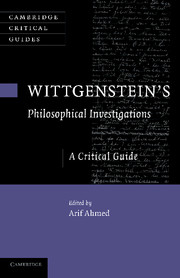Book contents
- Frontmatter
- Contents
- List of contributors
- Acknowledgments
- Introduction
- 1 From referentialism to human action: the Augustinian theory of language
- 2 What's doing? Activity, naming and Wittgenstein's response to Augustine
- 3 Measure for measure? Wittgenstein on language-game criteria and the Paris standard metre bar
- 4 Wittgenstein on family resemblance concepts
- 5 Wittgenstein on concepts
- 6 Wittgenstein vs contextualism
- 7 Wittgenstein and the linguistic turn
- 8 Rorty's Wittgenstein
- 9 Are meaning, understanding, etc. definite states?
- 10 Another strand in the private language argument
- 11 Deductive inference and aspect perception
- 12 Remembering intentions
- Bibliography
- Index
1 - From referentialism to human action: the Augustinian theory of language
Published online by Cambridge University Press: 06 July 2010
- Frontmatter
- Contents
- List of contributors
- Acknowledgments
- Introduction
- 1 From referentialism to human action: the Augustinian theory of language
- 2 What's doing? Activity, naming and Wittgenstein's response to Augustine
- 3 Measure for measure? Wittgenstein on language-game criteria and the Paris standard metre bar
- 4 Wittgenstein on family resemblance concepts
- 5 Wittgenstein on concepts
- 6 Wittgenstein vs contextualism
- 7 Wittgenstein and the linguistic turn
- 8 Rorty's Wittgenstein
- 9 Are meaning, understanding, etc. definite states?
- 10 Another strand in the private language argument
- 11 Deductive inference and aspect perception
- 12 Remembering intentions
- Bibliography
- Index
Summary
Words are deeds
– CV 46In this way, I should like to say the words “Oh, let him come!” are charged with my desire. And words can be wrung from us, — like a cry. Words can be hard to say: such, for example, as are used to effect a renunciation, or to confess a weakness. (Words are also deeds.)
– PI 546INTRODUCTION
In this chapter, I present an interpretation of the first twenty or so sections of the Philosophical Investigations. My presentation has three parts. First, I briefly compare and contrast Wittgenstein's philosophical intentions in the Investigations with his intentions in the earlier Tractatus Logico-Philosophicus. Second, against that first backdrop, I explicate Wittgenstein's famous thesis that meaning-is-use. Third and finally, against that second backdrop, I unpack Wittgenstein's opening argument for the meaning-is-use thesis. This opening argument is a philosophical roadmap for Wittgenstein's other arguments in support of the meaning-is-use thesis, in the pregnant sense that the basic concepts and strategies he later deploys are already etched into it and guide his further moves.
FROM THE TRACTATUS TO THE INVESTIGATIONS
Wittgenstein's Tractatus brings a definitive closure to Logical Atomism by pushing the reductive project of logical-decompositional analysis to its limits and beyond. The Tractatus clearly indicates or shows – even if it does not explicitly describe or say – the inadequacy of Logical Atomism and of the very idea of logical-decompositional analysis.
Keywords
- Type
- Chapter
- Information
- Wittgenstein's Philosophical InvestigationsA Critical Guide, pp. 11 - 29Publisher: Cambridge University PressPrint publication year: 2010
- 1
- Cited by

